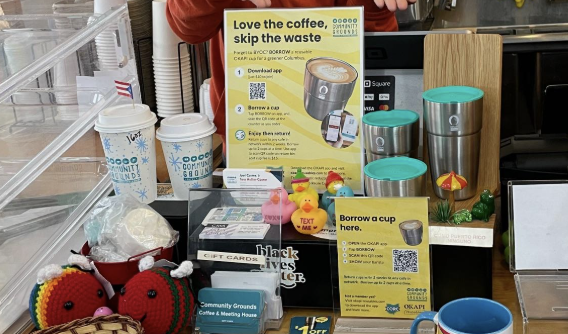Reuse vs Single-use: Safety
With the Covid-19 pandemic, the plastics industry has pushed a narrative that single-use is somehow safer than reuse.
The good news is the evidence shows that reuse is safe across a wide variety of measures, and is likely safer than single-use.
The public health professionals say:
COVID-19 primarily spreads from inhaling aerosolized droplets, rather than through contact with surfaces.
The virus is especially vulnerable to soap, and commercial and home washing systems easily destroy all virus particles that may be present on reusable foodware.
Single-use products like plastic cups, plastic-wrapped utensils or plastic bags are handled by several retail workers before reaching the customer. Whereas, reusable products provided by a retailer – like cups, plates, utensils, and to-go containers – must be adequately cleaned and sanitized according to food safety regulations.
Restaurants and retail food service are among the most highly regulated businesses in terms of public health.
Based on the best available science and guidance from public health professionals, it is clear that reusable bags and foodware can be used safely by employing hygienic practices.
Learn more by checking out answers to the seven most frequently-asked questions below.
Note that though much of this information is still relevant, this page is no longer being updated. Get the latest information from the FDA and CDC.
-
Short answer: Available evidence indicates that the virus spreads primarily from inhaling aerosolized droplets, rather than through contact with surfaces
According to the US Centers for Disease Control and Preventions (CDC),“The virus is thought to spread mainly from person-to-person…between people who are in close contact with one another, through respiratory droplets produced when an infected person coughs, sneezes or talks.”
In addition, “It may be possible that a person can get COVID-19 by touching a surface or object that has the virus on it and then touching their own mouth, nose, or possibly their eyes.” But the CDC also states that transmission of the virus from surface contact has never been documented.
The CDC recommends cleaning and disinfecting surfaces as precautionary measures and recommends hand washing as the most important prevention measure for surface contact transmission.
-
Short answer: No. Even though odds of getting the virus from surfaces are extremely low, based on how long the virus lasts on surfaces and typical consumer and worker behavior – disposable products are not safer than reusable ones.
In one study, the virus was shown to be infectious for up to 24 hours on paper and cardboard and between 2-3 days on plastic and stainless steel. In another study, the virus was not found to be infectious on print or tissue paper, whereas it was infectious up to 1 day on cloth, up to 4 days on glass, and up to 7 days on plastic and stainless steel. COVID-19 can be found on both disposable and reusable materials, and plastic is one of the materials on which it survives longest.
In theory, any object brought into a public space either by customers or workers could have the virus on it. Customer’s purses, wallets, credit cards and clothing also touch surfaces. However, they are not temporarily restricted like reusable bags in some places. This points to the inconsistencies, and also lack of rationale and science, which are driving these restrictions.
If you or your customers are still worried about surface transmission of COVID-19 (even though the latest research confirms there’s no evidence of this happening), let hygiene and sanitation guide your choices.
-
Short answer: In the CDC and FDA guidances, reusable products are not considered problematic or a cause for concern. Social distancing and hygiene are the primary protections for workers and consumers in retail food settings. To protect workers and customers in restaurants and bars, current recommendations from CDC defers to the FDA. The FDA Guidance on Best Practices for Retail Food Stores, Restaurants, and Food Delivery Services during the COVID-19 Pandemic focuses on social distancing, foodware washing and sanitizing, cleaning and sanitizing, and personal protective equipment (PPE) for workers. No mention is made of any threats posed by reusable bags, cups or cutlery or other reusable products. The California Department of Public Health (CDPH) states: “The CDC, FDA and CDPH are not aware of any reports at this time that suggest COVID-19 can be transmitted by food or food packaging.”
-
Short answer: The National Restaurant Association’s Guide to Reopening re: COVID-19 adheres to FDA guidance, focusing on cleaning, disinfecting, and social distancing. They don’t promote single-use products. The only mention of reusable products is a suggestion to clean reusable menus.
-
Short answer: Reusable products used in food service must meet strict safety requirements.
Restaurants and retail food service are among the most highly regulated businesses in terms of public health. Existing state food safety codes are based on FDA Guidance to States. State food safety codes require extensive ware washing and sanitizing at high heat that meets the level of hygiene and disinfection required by the FDA and CDC.
Tom Szaky, CEO of Terracycle/Loop cites their reusable container washing system: “We are protecting for other pathogens and concerns that are way more potent than COVID.”
-
Short answer: Even though this should not be a concern (according to health experts), if a customer brings reusable products into a retail space, contact-free practices could protect workers.
Systems in which there is no contact between the customer’s reusable cup, container or bag and retail surface areas could, in theory, protect workers – and are consistent with the “abundance of caution” approach to addressing COVID-19 transmission.
For example, in states like California that have plastic bag ban laws, customers are accustomed to bringing their own reusable bags. California’s Occupational Safety and Health Administration (CalOSHA)’s guidance for infection prevention in grocery stores recommends, “When customers bring their own bags, employees should be instructed:
Not to touch or place groceries in customer brought bags.
Ask customers to leave their own bags in the shopping cart.
Ask customers to bag their own groceries.”
-
Short Answer: While BYO is great, what’s even better is when businesses have reuse systems which serve customers in ways that don’t generate waste. When cafes and restaurants provide reusable cups and containers for take-out, customers don’t have to remember to BYO.
Any product designed to be used for a matter of minutes and then thrown away is not a sustainable or safe option, regardless of whether it’s made from plastic, paper, metal or plants. The real culprit isn’t just single-use plastics - it’s “single-use” itself.
But the good news is, that all over the world, businesses are creating reusable cup, container, and packaging services so that customers don’t have to remember to BYO. It’s just the way they’re accustomed to getting their coffee, takeout or groceries.
Reducing disposables coupled with innovative reuse systems is not only the right thing to do for the planet - it also saves businesses money, creates local jobs, protects health and reduces plastic pollution at the same time.

























EPISODE 188: Real talk on challenges and opportunities when it comes to centering people and planet in policymaking.